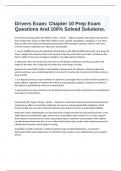Drivers Exam: Chapter 10 Prep Exam
Questions And 100% Solved Solutions.
how alcohol and drugs affect the ability to drive - Answer millions of people take drugs every day and
don't realize these drugs can affect their ability to drive. alcohol, tranquilizers, marijuana, or any other
drug can affect the mental and physical (psychomotor) skills needed to operate a vehicle. even some
over-the-counter medications can affect your driving skills.
1. we are all different and each individual's driving skills can be affected differently by the same drug. the
driver's weight and emotional state or the amount of the drug and when it was taken, all influence the
driver's ability to size up an emergency situation or to judge speed or distance.
2. taking more than one drug at the same time can be dangerous because each drug can add to the
impact of the other. this is especially true when one of the drugs is alcohol.
based on the Texas Motor Vehicle Crash Statistics, driving under the influence, which includes both
alcohol and drugs, was a contributing factor in 3 percent of crashes and 31 percent of all fatal crashes in
Texas in 2009.
1. it is illegal to possess an open container of alcohol in a passenger area of a motor vehicle located on a
public highway, regardless of whether the vehicle is being operated, stopped, or parked. conviction of
this offense is punishable by a fine not to exceed $500.
2. possession of an open container of an alcoholic beverage increases the minimum term of confinement
by six days for a first offense.
alcohol and other types of drugs - Answer marijuana= research has shown even typical social doses of
marijuana can affect concentration, judgment, and sensory and perceptual skills needed for careful
driving. people who are under marijuana influence have impaired sensory and perceptual abilities.
stimulants= heavy amphetamine use may keep drivers awake and active for long periods of time, it also
makes them less coordinated, edgy, and four times more likely to be involved in a car crash. research
shows typical social amounts of cocaine can produce lapses in attention concentration. while caffeine
can help drowsy drivers stay alert, it can't make a drunk driver sober. studies show ordinary amounts of
caffeine don't improve a drunk subject's driving.
tranquilizers/sedative-hypnotic= sedative-hypnotic drugs including barbiturates, are powerful
depressants which calm people down or help them sleep. sleepy or over-sedated drivers are not good
drivers.
, over-the-counter drugs= many over-the-counter drugs cause drowsiness in some people which can affect
their driving. read the labels and be careful with antihistamines, other cold preparations, or any
medicine that relaxes or promotes sleep.
any drug= any drug might affect your ability as a driver. if you take more than one drug or if you mix
drugs, especially tranquilizers or other sedative-hypnotics, with alcohol, you could be asking for trouble
on the road and off. if you have doubts about a drug or drug mix, check with a doctor or pharmacist.
alcohol= each year alcohol, a depressant drug affecting coordination, judgment, perception, and
emotional state, is responsible for half of all American highway deaths. alcohol increases the depressant
effects of tranquilizers and barbiturates. mixing these drugs, on or off the road, can be hazardous.
texas has tough alcohol-related laws for minors - Answer driving While Intoxicated (DWI) is a problem
affecting all Texans. to make Texas safer, laws have been
enacted to deter people from drinking and driving or to punish those who choose to drink and drive. in
Texas
you are considered legally intoxicated if you have a blood alcohol concentration (BAC) of 0.08 or more.
DWI penalties for driving under the influence of alcohol or drugs - minors - Answer 1st offense= class B
misdemeanor punishable by a fine not to exceed $2,000, confinement in jail for 72 hours to 180 days,
and suspension of the driver license (or privilege denied if not licensed) for 90 to 365 days. the court
may probate the jail sentence and waive the license suspension on the first offense only. possession of
an open container of an alcoholic beverage increases the minimum confinement by three to six days.
2nd offense= class A misdemeanor punishable by a fine not to exceed $4,000, confinement in jail for 30
days to 1 year, and suspension of the driver license (or privilege denied if not licensed) for 180 days to 2
years.
3rd offense and every offense after= third degree felony punishable by a fine not to exceed $10,000,
confinement in the penitentiary for 2 to 10 years, and suspension of the driver license (or privilege
denied if not licensed) for 180 days to 2 years.
DWI with passenger under 15= a state jail felony punishable by a fine not to exceed $10,000 and
confinement in jail for 180 days to 2 years.
intoxication assault= third degree felony punishable by a fine not to exceed $10,000, confinement in the
penitentiary for 2 to 10 years, and suspension of the driver license (or privilege denied if not licensed) for
90 days to 1 year.
intoxication manslaughter= Second degree felony punishable by a fine not to exceed $10,000,
confinement in the penitentiary for 2 to 20 years, and a
suspension of the driver license (or privilege denied if not licensed) for 180 days to 2 years.




